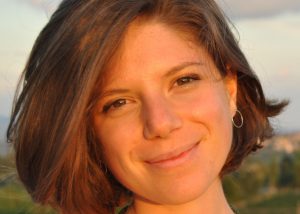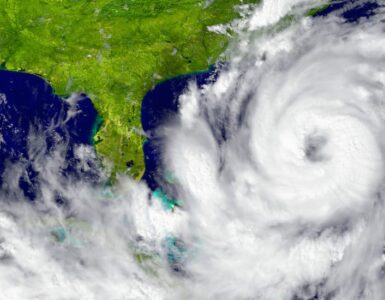Reading PhD student, Elena Saggioro, opens up about why it’s so important to face up to climate change and to take action to stop it, and how her studies at Reading are helping her to do just that.
Elena chose to come to Reading to study her combined master’s and PhD in Mathematics of Planet Earth, because she wanted to learn more about climate change. Based in Reading’s Department of Mathematics and Statistics, but also working closely with climate experts in the Department of Meteorology, Elena’s research focuses on climate variability – which is the variations in the climate beyond individual weather events, for example why a certain summer was hotter than usual.
Elena explained her drive to study climate change: “I come from a theoretical physics background and wanted to understand why climate change happens and how it works. Towards the end of my master’s degree in physics, which I studied in Italy, I became more aware of the scale of the climate problem.
“I couldn’t understand why I was living essentially unaware of the actions we needed to take to stop, or at least drastically limit, the effects of climate change when this is the biggest issue we’ve ever faced.
 “I wanted to do something, but didn’t feel I knew enough about the problem. I came to Reading so I could learn more and hopefully find a way to contribute to tackling this problem.”
“I wanted to do something, but didn’t feel I knew enough about the problem. I came to Reading so I could learn more and hopefully find a way to contribute to tackling this problem.”
Elena’s motivation partly comes from the urgency of the climate crisis. She said:
“If we don’t do something now, we will regret it enormously. People who are experts in the field call this the decisive decade. This is because the next ten years or so will reveal whether we have made the changes to limit warming to a manageable level, or whether we will enter unchartered territory.
“There’s a lot of pressure on us – the generations alive on Earth right now – to address this issue. I believe we have the ability to turn the boat around as we finally have the knowledge and the technology to change. We have no option but to act, but we must be careful in the solutions we choose and understand their consequences on people and across sectors. Climate change is a large multi-dimensional problem, there’s no easy fix.”
Working with policymakers
Elena undertook a three-month internship with DEFRA (Department for Environment, Food and Rural Affairs) during her PhD, in a bid to understand how, in her future, she could combine her scientific knowledge with policy to make a real impact.
She said: “I joined a team which collects scientific evidence to support policymaking on nature-based solutions and international aspects of the UK’s climate and biodiversity policies – for example, international negotiations and aid. My main task was collating a record of the general scientific evidence underpinning nature-based solutions and to quantify their potential for climate adaptation, poverty alleviation and the protection of biodiversity in developing countries.
“I was able to finalise this report, which civil servants in my DEFRA team are continuing to use now for information on this growing area of policy. I was also lucky to observe up close how science is being used to inform the UK negotiations’ positions on nature and climate.”
Elena also values the exposure she got to policy and negotiations when she attended the 24th UN Climate Change Conference of the Parties (COP) in Katowice, Poland. She went with the Walker Institute – the University’s climate resilience research centre – as an academic observer.
She said: “My time at DEFRA and experiences at Reading have really opened my eyes to how someone with my background can work with policymakers, and how valuable this interaction can be. Data and science, if tailored to their specific needs and communicated well, can help people with making effective decisions.”
Personal climate action
Elena is not only committed to contributing to climate action in her professional life, but in her personal life as well.
She explains: “The main thing I’ve changed is to shift my diet towards a more plant-based one. I’m not vegan but I have almost eliminated my meat and dairy intake. I know that plays a big role in terms of an individual’s emissions, land and water use. I’m also doing less flying – when I return to Italy I often go by train, even though it’s a much longer journey.”
Elena was also involved in climate action initiatives at Reading before the pandemic began: “I worked with other PhD students to organise events to raise awareness on climate change across campus. This was a really positive and enriching experience for me, which helped me connect with other people who are passionate about these issues.
“One thing I’ve learnt, however, is that focusing on your individual changes can only achieve so much. We need to focus on the bigger picture now and join forces with others to achieve the large system change we need. For example, I believe it’s important to use our vote to demand that this issue becomes a priority – we need wider societal action to tackle this urgent problem.”
Making an impact
Elena shares her aspirations for the future and how she hopes to make a difference in the fight against climate change.
She said: “I came to Reading to deepen my understanding of climate change, and I certainly know so much more than I did before. I am especially glad that I could broaden it to aspects of biodiversity and poverty, at DEFRA, and of adaptation and resilience, through the Walker Institute.
“I’ve also realised that the more you learn, the more you realise you still don’t know – but this is part of the process and I love being challenged. All in all, studying at Reading has given me a lot. All the inspiring people I have met have strengthened my desire to work to solve the environmental issues we’re facing.
“Through my PhD and time at DEFRA, I have realised that I want to use my scientific background to help the design of effective climate policy. I’m really excited to be joining the Walker Institute to work on climate adaptation plans for vulnerable countries in the Middle East. This is such an important issue and I want to devote all my time and energy to work on its solutions.”
Discover more about the University of Reading’s climate research.






